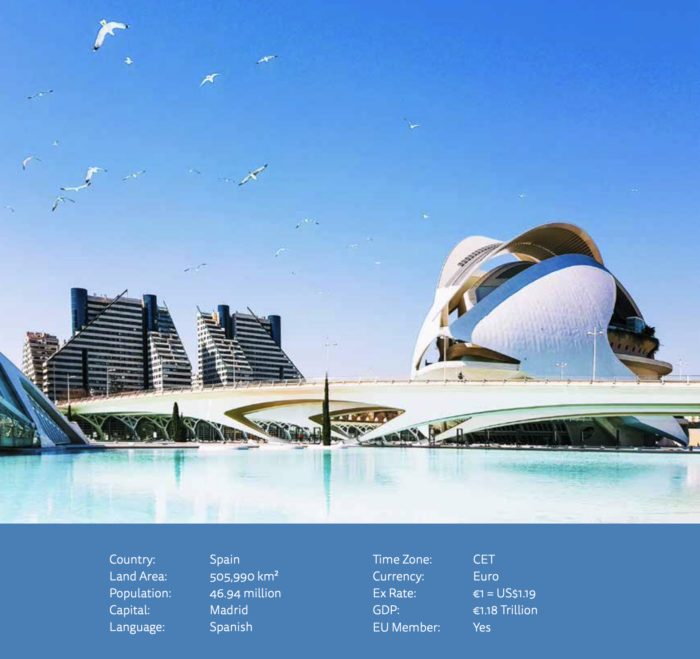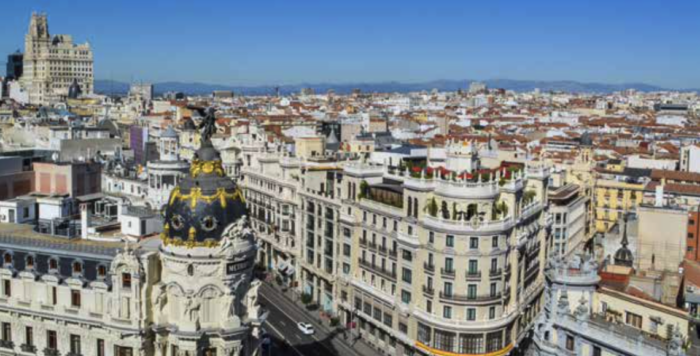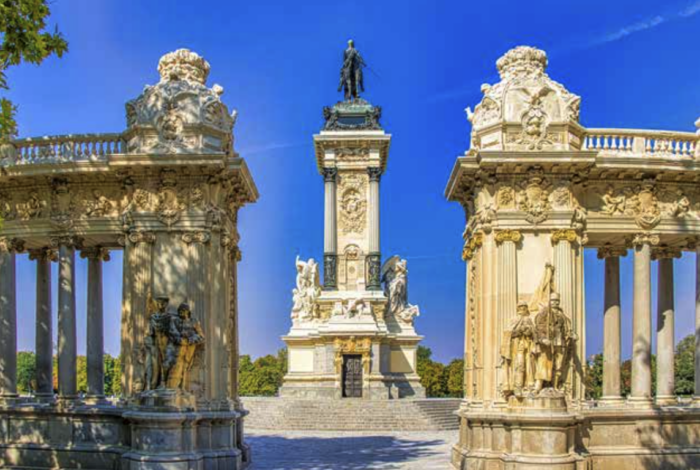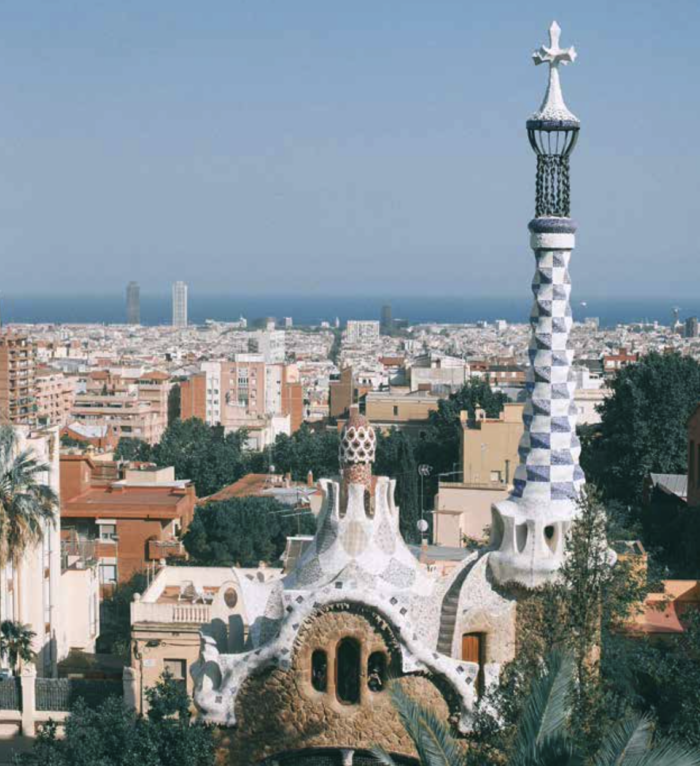Most of the Iberian Peninsula has been populated since prehistoric times with some archaeological evidence pointing to Northern Spain having been inhabited some 800,000 years ago. Originally populated by the Iberians, Spain was eventually acquired by the Roman Empire and they held power for six centuries, influencing the future of the Spanish language and culture.
Spain was next ruled by the Visigoths, a Germanic people, and invaded by the Moors in 711 before the Christian kingdoms to the north drove them out.
The discovery of the New World changed Spanish history forever. Treasure from Spain’s overseas empire made the country rich, but constant wars drained resources. With the Bourbon dynasty ascending to the Spanish throne, Spain actually came under French influence for the next hundred years until the defeat of Napoleon.
During the 20th century, Spain had frequent changes of government and when King Alfonso XIII abdicated, Spain was declared a republic. This sparked the Civil War and when Franco’s Nationalist forces overthrew the Spanish democratic republic, he became the head of government. When Franco died in 1975, Spain was taken over by King Juan Carlos I, who took the country toward democracy. As a result of its new freedoms, the country celebrated a cultural renaissance in the 1980s and 1990s and became the Spain we know today.
Principal Industries in Spain
The main industries in Spain are comprised of sectors such as manufacturing, tourism, agriculture and energy.
Other Important Industries
Although the above industries are the main drivers of Spain’s economy, there are other industries which employ a lot of people. These include aerospace, defence, automotive and ICT among others.
Doing Business in Spain
Spain is a significant economic power in Europe. It has a €1.18 Trillion GDP, 47 million residents and is the fourth-largest economy in the Eurozone. Since recovering from the global financial crisis in 2014, Spain is in its strongest economic position in years. The introduction of expansive domestic structural reforms and Spain’s ability to obtain access to affordable, external financing from international markets has generated a lot of investor interest. These changes have also increased labour flexibility and generated new business growth, making Spain an increasingly attractive proposition for somewhere to conduct global business.
Spain also benefits from factors such as a strong structural infrastructure, an educated workforce and government commitments to give more autonomy to local regions. This would help to diversify the economy and open up new business opportunities. Also, don’t forget that Spain’s strategic location makes it the ideal hub for trade in the EMEA region (Europe, Middle East, Africa). Alongside its EU membership, Spain also has strong cultural and trade ties with Latin America.
The View from the Ground
When describing a country and its culture, you can write down all the facts and figures you like but if you want the full story, you need to get the perspective of someone with a lived experience of being there. That’s why we’ve asked Fernando to give us his take on what it’s like to live and work in Spain.
The most important thing for doing business in Spain is to be there in person for face-to-face contact. What I mean is going out for a coffee, going out for a drink or going for lunch. That’s where business is created and that’s where everything happens. Actually, the more trust they have in you, and you create that trust by going out for a coffee or whatever, the more they give you opportunities to build some sales processes or close deals. If you’re coming here, not even just as a foreigner but as a Spanish guy too and you want to go cold selling door-to-door, by phone, email or whatever, then it will be very difficult for you to get into the business process in Spain. But, you can get a lot of business through referrals. For example, I know Juan and he knows this company that I can provide a solution for. So, Juan can refer me to that company. A network is a big help for doing business in Spain. When I first came here, I registered myself in a weekly after-work club for business owners. I went to events, fairs, and exhibitions, just to create a network here. And recently, I have registered Aexus at Startup Valencia and we are the only Dutch company there, so it’s a really big thing. I was able to do this because of the network I’ve built up so yeah, it’s very important to know people here and never forget that referrals are a two-way street. Also, once you do some good business, the referrals come faster and easier as well. I’ve seen the same thing happen with other colleagues and friends who have a business here. One of the most important things here is to be able to read and speak Spanish. English is still very difficult for Spanish people and more than 50% of them don’t know a single word of English. You have to understand Spanish culture too as this makes it easier to integrate into Spanish life and to get things done. There’s very much a “if you can do this for me, I can do that for you,” culture in Spanish business.
Regarding the tech scene here, Valencia invested a lot of money into university education. They brought in Erasmus students, they created new departments and there’s one university that is specifically focused on tech, innovation and AI, right here in Valencia. This means there is a new generation coming out now who has a serious focus on tech. So, it would seem that the investment is paying off. Well, for the tech sector at least. For example, we are now members of Startup Valencia and there are like more than 200 tech companies from Valencia and new companies are joining the scene every day. So, you can see there is a big growth in tech and innovation here in Valencia. We’re still in the beginning phase, and there is a long way to go to catch up with Madrid and Barcelona but there are still a lot of positives. We have a load of new talent coming through and a lot of new, interesting companies are coming to Valencia. Right now, Valencia is the place to be. The tech scene is smaller than the big cities but it’s growing so now is the time to get in on it. There are other reasons as well of course. Valencia is right in the middle of the coastline; the cost of living is cheaper and business costs are cheaper too if you want to rent studio space or buy an office.
Recently, in fact, the last time I was talking to my network in this community from Startup Valencia, I spoke with different owners, a lot of whom are Spanish and right at this moment, they want to stay on in the Spanish market. There are others though who are focusing on South America but aren’t looking at the Nordic, Benelux or German markets and the reason is because they don’t speak English. This is of course where I come in with Aexus as the solution. As you know, we have people on the ground in all of these locations. So, there are a few who are waiting for more funds and then I think we’re definitely gonna get some business from this network. And of course, it works the other way around as well for companies who want to scale into Spain. Spain’s not like it was 20 years ago or even ten years ago. It’s much more modern, more evolved and more international than it used to be. There’s still some way to go but I think there are a lot of opportunities for business now.
It’s well known that the Spanish like South America a lot, but they are not so keen on the Balkan and Eastern European countries. They’re not happy with them from an immigration point of view and see them as criminals. They also don’t like those countries from a business point of view as it increases competition. Spanish people in Valencia will not mix with the Romanian population that live there. There’s a big community of Romanians but you can see that the Spanish don’t let them in.
Going back to the informality of business meetings, I’ve done several of them while eating steak. We’re out eating steak and shaking hands on a deal right there. We didn’t have any paper or contracts with us, but that was finalised the next day. You can get a lot of contracts here just by shaking hands over a business dinner or lunch meeting.
There is still a strong hierarchy in Spain as in, “I am the boss and my staff will do exactly as I say.” In my last company, I had to be available 24/7. I would receive calls at ten or eleven o’clock at night on Saturdays and Sundays. I worked with two Spanish companies here and both of them were like that. They expect a lot from their employees, and they don’t care if it’s the weekend or way outside your contractual hours. There are a lot of CEOs like this, but you still only get paid for 9 to 5. Spanish people are used to being treated like this and just accept it. I wasn’t prepared to accept it and that’s why I left. I am in a fortunate situation though. I had other options and other opportunities. The problem for many Spanish employees is that there aren’t enough jobs to go around. So, they will accept being treated like dirt by the boss so they can keep their job. It’s a very sad situation but it’s the reality here.
There is some unemployment assistance given by the government, but the rules are quite strict. For a start, you must have been working for at least one full year before you can claim and then, even if your claim is successful, you can only receive payments for two years. The payments start off at around 60% to 70% of your last salary and gradually get lower and lower until the two years expire. So, the system forces you to take any job, even one where you are treated badly. The alternative is you’d be homeless.
Spain is still a massively religious country regardless of whether you’re from the older or younger generation. They take it very seriously and are bound to certain Roman Catholic traditions such as celebrating a number of feast days throughout the year, including two days for the Assumption of Mary.
Also, for example, the sixth of January is known as “The Three Kings’ Day,” this is something that is celebrated intensely and they take one week off for it. So, the first week of January they don’t work at all. And, the 6th of January is actually for the family and for the children. Whereas we might give gifts on Christmas Day, the Spanish do it on the 6th of January. On top of this, every area has its own religious holidays. For example, like here in Valencia, on the 15th of March we have a whole week of celebrations.
The Spanish in Valencia are a lot of fun. You already know they like to go out for food and drinks, but Fridays are a bit special. On Friday afternoons, most companies stop working at three in the afternoon and they go for a long lunch until the evening. After that, they start with the gin and tonics and beers, in fact everything until late in the night. That’s something that is very common here. Of course, Sunday is the day for paella. So, on a Sunday you get together with friends and family and you go for a paella. You can also buy one to take home or make your own. That’s very traditional and something of a Sunday ritual here. It’s not all about eating and drinking though. We have mountains, we have the sea, and we have the beach. You can literally go skiing in the morning and be on the beach in the afternoon. We also like to have fun in the office, whether it’s celebrating someone’s birthday or any other event that we can hijack as an excuse to go out for dinner and a few drinks.
In terms of becoming good friends with Spanish people, it’s not so easy. I have good friends now of course but I remember that it took a long time and required a lot of effort on my part. The essential thing is that you speak Spanish. When I arrived, I didn’t speak a word, so I studied. I also threw myself into international groups where I knew there would be Spanish people and eventually, I was accepted. But you need to live and work with the Spanish and integrate yourself into their culture and their ways. I have done that and now I can proudly say that Spain, and Valencia in particular, is my home.
Business Etiquette
Spanish business etiquette requires you to be formally dressed unless otherwise specified and remember to call people Señor and Señora respectively. Don’t necessarily expect business to be top of the agenda at the first meeting, as these are generally used for getting to know each other and building a relationship. With this in mind, it’s a good idea to have one side of your business card printed in Spanish, this will be greatly appreciated. The decision-making pace in Spanish business is rather slow. Decisions are usually not made at the first meeting, because Spanish businesspeople prefer to have a good rapport before talking about deals. Consequently, you should be patient while retaining a positive attitude.






